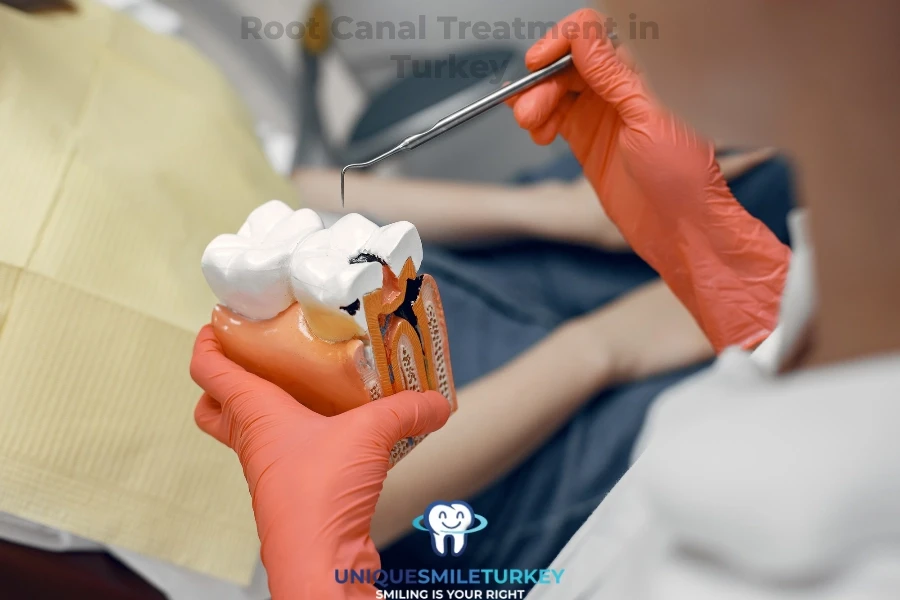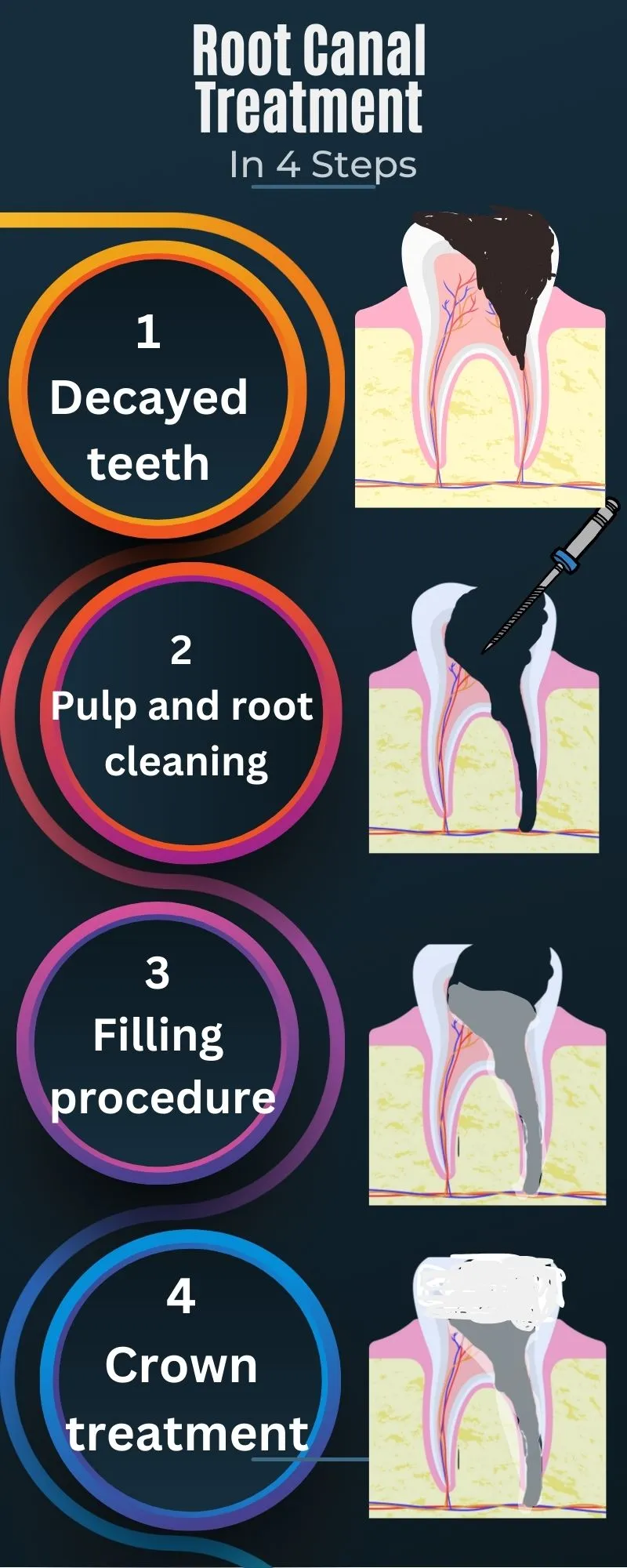


Root canal treatment is performed to salvage a tooth that has been badly decayed or diseased. This treatment becomes necessary when the soft pulp inside the tooth becomes inflamed or infected due to deep decay, a cracked tooth, or trauma. The dentist gently removes the diseased pulp, thoroughly cleans the inside of the tooth, and then closes it to stop the infection from spreading. Despite their reputation, modern techniques and anaesthetics have made root canals relatively comfortable procedures, allowing patients to preserve their natural teeth and maintain a healthy smile makeover.

Endodontics is a branch of dentistry that focuses on finding and fixing problems with the pulp, which is the deepest part of the tooth. The tooth's nerves, blood vessels, and structural tissues are all in the pulp. Most endodontics in Turkey have to do with root canals. To save the tooth, the broken or affected pulp has to be removed, the root canals have to be cleaned and sanitised, and then they have to be sealed. The goal of endodontic treatment is to save teeth that would have to be pulled out because of an infection or damage. As a dentist with extra training in this specialised area, endodontists near me are experts at root drills and other treatments that are related to them.

Root canal surgery typically involves several distinct root canal treatment stages to ensure its success.
The dentist begins by administering local anaesthesia to ensure the patient's comfort. Once the patient is numb, a protective sheet, known as a rubber dam, is placed around the tooth to isolate it and maintain a sterile environment.
The next crucial step is gaining access to the inside of the tooth. A small opening is carefully created in root canal and crown of the tooth, allowing the endodontic specialists to delicately remove the infected or inflamed pulp using specialized instruments. The inner chamber is then thoroughly cleansed and shaped to facilitate optimal filling.
After the thorough cleaning, the void left by the removed pulp is meticulously filled with a biocompatible material, usually gutta-percha. This seals the area, preventing further damage to the tooth's structure and protecting it from contamination. Depending on the case, a temporary or permanent filling is placed over the opening to safeguard the treated area.
In cases where a tooth's strength has been compromised, crowns are used for restoration and preservation. Impressions are taken, and a custom crown is fabricated to match the natural tooth.
Root canal treatments in Turkey are primarily categorized into two main types, depending on the complexity of the case and the type of tooth involved:
This kind of root canal treatment is most often used to treat infected root canal or damaged tooth pulp. Local anaesthesia is administered to numb the tooth and surrounding area. A small opening is created in the broken tooth root still in gum to access the pulp. The pulp is extracted if it's diseased or damaged, and the root canals are cleansed and reshaped. Root tubes are cleaned to get rid of germs. The cleaned root cavity is filled with gutta-percha to seal them. A crown is typically placed on the tooth to restore its strength and protect it.
When nonsurgical methods have failed, this private root canal treatment option may be explored. It is often used when problems or chronic concerns continue after a standard root canal without crown. The following are the stages involved in the procedure:
Local anaesthesia is administered. The dentist makes a small incision in the gum near the tooth to access the root tip. The root tip (apex) and any infected tissue are removed. The end of the root canal is sealed, and the gum is sutured. Over time, the bone naturally heals around the treated area.
Other root canal treatments
This is a partial pulp removal, often performed on primary (baby) teeth.
Root canal retreatment is a procedure used to fix teeth that have had earlier dental root canal treatment that either did not work or has continued to cause discomfort.
Advanced techniques using high-powered microscopes can be employed to perform precise surgical procedures on the root apex. Root canal treatment is optimal for a patient based on the diagnosis, the tooth, and the complexity of the situation. Only after consulting with an experienced dentist or endodontist can the appropriate treatment plan be decided.
Several benefits make root canal treatment a worthwhile dental procedure:
Root canals relieve excruciating pain in the tooth and surrounding area due to pulp infection or destruction.
The native tooth is kept in place, protecting dental function and appearance, and avoiding the need for extraction.
Root canals improve dental health by eliminating the cause of illness and stopping germs from spreading to adjacent teeth and gums.
Normal tooth function has been restored, allowing for efficient chewing and biting.
Aesthetics root canal-treated teeth are capped with crowns that are a close shade and form match to the surrounding teeth.
Endodontic surgery is often less expensive than having a tooth extracted and then replaced with a bridge or implant.
Teeth that have had root canal treatment may last a lifetime with good maintenance.
Abscesses and jaw bone deterioration, both of which may develop if an infection were left untreated, are avoided.
People with advanced carious tooth problems,
People with dental infections reaching the pulp and roots and
Patients with broken or cracked tooth problems deep into the tooth are suitable for this treatment.
Although the majority of people may benefit from root canals, the particular treatment plan will depend on the dentist's evaluation and the patient's particular circumstances. A dental consultation is necessary for a comprehensive assessment and customised treatment suggestions.
Root canal treatment becomes imperative when a tooth's innermost core, known as the pulp, becomes inflamed or infected. Numerous factors, such as severe corrosion, fissures, or damage, might cause this condition to occur. Untreated inflammation or infection may result in excruciating pain, the development of an abscess, and even bone loss surrounding the tooth. Recognising the need for a root canal treatment involves symptoms like persistent pain, sensitivity to hot and cold, swelling, and tenderness in the surrounding gums. In addition to easing pain, prompt intervention with a root canal operation saves the tooth from extraction, preserving dental health and functioning.
On average, a simple root canal treatment Turkey might cost around $150 to $1000, while more complex cases or treatments requiring specialized care could cost more. The position of the tooth, the intricacy of the case, and the patient's location are a few variables that might affect how much a root canal operation costs. The necessity for more expensive operations, such as tooth extraction and replacement options, is reduced as a result in root canal treatment Antalya. You may have a better sense of what to anticipate if you discuss the expected cost with our dentist.
Average root canal and crown costs are $150 - $1000 and $300 - $1500. The root canal and crown costin Turkey depends on the dental clinic's location, the crown type, the root canal procedure's complexity, and the expertise of endodontist Turkey.
Note that these are indicative pricing estimates and clinic root canal chargesmay vary. You should call dental clinics directly to acquire precise and up-to-date pricing estimates depending on your dental requirements. Turkey is a popular dental tourism destination since numerous dental clinics provide high-quality service at low prices.
Yes, root canal treatment is suitable for dental tourists. Many overseas patients fly to Turkey for root canals and other dental procedures. Dental tourists in Turkey may benefit from root canal treatment for numerous reasons:
Turkey's dental treatment is cheaper than many others. Dental visitors may save a lot while getting high-quality care.
Turkey offers several skilled dentists who give high-quality care. Tourist spots like Antalya have contemporary dental facilities with a variety of treatments.
Tourists may combine dental treatment with a vacation in a beautiful and culturally rich nation. Turkey's attractions include historical buildings and breathtaking scenery.
Many Turkish dentists speak English, helping overseas patients comprehend their treatment and follow-up.
Turkish dental clinics engage in cutting-edge technology to provide patients with excellent treatments.
As with any medical trip, it's important to choose a trustworthy dental facility, check the dentist's credentials, and make sure the clinic follows international cleanliness and patient care standards. Remember to plan your lodgings and post-treatment care to maximise your dental tourism experience in Turkey.
Recognising the need for a wisdom tooth root canalhinges on heeding telltale dental distress signals. Unrelenting, throbbing tooth pain, particularly when chewing or applying pressure can signify trouble. Heightened sensitivity to hot or cold sensations, lingering even after the stimulus is removed, is another indication. Sore, swollen lips and a bump on the gums that looks like a pimple are signs of a possible abscess. Discolouration of a tooth can also point to underlying issues. Should any of these signs manifests, swift consultation with a dentist is crucial. In order to avoid additional issues and protect your dental health, a professional assessment will determine if a root canal treatment is necessary.
Initially, avoid chewing on the treated tooth rootuntil a permanent restoration is in place. Practise meticulous oral hygiene, brushing and flossing regularly but gently around the area. Steer clear of extremely hot or cold foods to prevent sensitivity. Attend follow-up appointments as scheduled for the placement of a crown or other restoration. If you notice unusual symptoms or persistent discomfort, promptly consult your dentist. By following these aftercare instructions, you will help the treated tooth recover properly and for the long term.